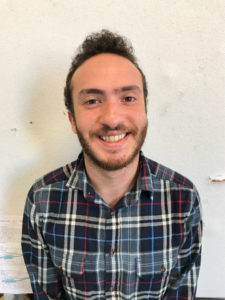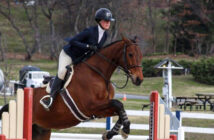
Hadi El Kebbi, ’19, was awarded a Strol undergraduate research grant to photograph the city of Beirut for 6 weeks in the spring of 2017. El Kebbi displayed his photographs in an exhibit, “Portraits of Beirut,” in the Girdler Gallery on Nov. 30, 2017. (Micah Golob-Leavitt/B&W Staff)
Lebanese international student Hadi El Kebbi, ’19, returned to his home country with a specific goal in mind — to compare Beirut’s culture and architectural designs to those he experiences in America.
Through a Strohl undergraduate research grant, El Kebbi was awarded the opportunity to photograph the city in spring 2017 for over a month and a half.
The photographs are featured in his exhibit, “Portraits of Beirut,” which opened in the Girdler Gallery in the University Center on Nov. 30. Prior to this experience, El Kebbi — who is an architecture major — said he had little experience with photography.
“To say that I’m an experienced photographer would be a huge lie, but I feel like this project was a huge success because it had a personal element to it,” El Kebbi said. “It was more than just a photography project, it was me trying to change the perception about Lebanon.”
El Kebbi said his father is a talented photographer and served as his primary influence for this collection. He said he’d like to follow in his footsteps, but he doesn’t have a thesis for what he’d like to photograph.
El Kebbi’s motive was to raise awareness about Lebanese culture and eradicate the preconceived notions people hold about the country and the Middle East in general.
“(The collection’s purpose) is to break the stereotype about Lebanon and get people out of their bubble and believe that every single country has its own unique type of culture and richness,” he said. “The problem is that not many people have been exposed to the Lebanese culture, and that’s why the general perspective is kind of confused.”
Throughout his project, El Kebbi was assisted by faculty members, including professor of design Anna Chupa, who helped him print, frame and mount his photographs. Assistant professor Nik Nikolov, who was El Kebbi’s faculty adviser for his Lebanon trip, accompanied him throughout the duration of the project.
“He’s one of our best, I could not speak any more superlatively about him,” Nikolov said. “He has his feet on the ground and head in the clouds.”
Nikolov said El Kebbi is a motivated student who takes pride in his work and learning new material.
Ileana Exaras, ’18, met El Kebbi last semester through mutual friends in the international student community. Exaras, who acted as a source of support for El Kebbi during this project, agrees with Nikolov that he is one-of-a-kind.
“(El Kebbi) is a very empathetic person who has the ability to observe what’s going on around him,” Exaras said, “and because of this unique ability, he’s hilarious, and that’s how you know he’s an artist.”
El Kebbi said his favorite part of the project was exploring the identity of a country he’s lived in his whole life. He said he noticed different aspects of his surroundings, especially after waking up at 5 a.m. some mornings to take photographs.
Although El Kebbi acknowledges it’s difficult for some people to let go of their perceptions of the Middle East, he encourages people to step out of their comfort zones and experience Lebanese culture.
“Before the end of the semester, people always come to me and tell me, ‘Have a safe flight, be safe there,’ and I’m like, ‘Honestly, it’s not bad,’ but that’s just the general perspective,” he said.
El Kebbi used his Strohl grant to share his culture with Lehigh’s student body. He took the initiative to develop his own agenda and purpose, and he said it paid off dramatically.
“I think at some point students have to jump off the deep end and do their own thing,” Nikolov said. “That’s what (El Kebbi’s) doing, and that’s the future.”





Comment policy
Comments posted to The Brown and White website are reviewed by a moderator before being approved. Incendiary speech or harassing language, including comments targeted at individuals, may be deemed unacceptable and not published. Spam and other soliciting will also be declined.
The Brown and White also reserves the right to not publish entirely anonymous comments.